
views
X
Research source
Dale Prokupek, MD. Internist. Personal interview. 16 April 2020.
Testing is the only sure way to determine if you have HIV. There are symptoms to look for that could be a warning that you have an infection.
Spotting Early Symptoms

Determine if you are experiencing acute fatigue with no explainable cause. Fatigue can be the sign of many different illnesses, but it's a symptom experienced by many people with HIV. This symptom shouldn't cause great alarm if it's the only one you're feeling, but it's something to look into further. Acute fatigue isn't the same as simply feeling sleepy. Do you feel tired all the time, even after a good night's sleep? Do you find yourself taking more afternoon naps than usual, and avoiding strenuous activities because you feel low energy? This type of fatigue is cause for concern. If this symptom persists over a few weeks or months, be sure to get tested to rule out HIV.
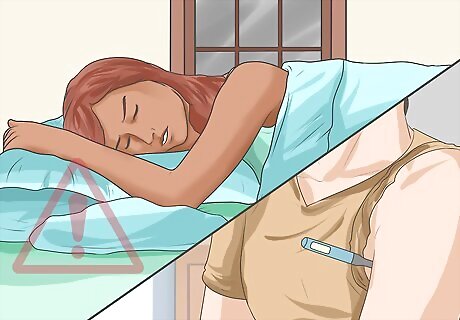
Be on the lookout for a fever or excessive night sweats. These symptoms commonly occur during the early stages of an HIV infection, during what is called the primary or acute HIV infection stage. Again, many people don't have these symptoms, but those who do usually experience them 2-4 weeks after contracting HIV. Fever and night sweats are also symptoms of the flu and the common cold. If it's flu or cold season, that might be what you're experiencing. Chills, muscle aches, sore throat, and headache, which are also symptoms of the flu and cold, can also be signs of an early HIV infection.

Check for swollen glands in the neck, armpits, or groin. The lymph nodes swell in reaction to bodily infections. This doesn't happen to everyone who has primary HIV, but among those who have symptoms, it's a common one. The lymph nodes in the neck tend to swell more than those in the armpits or groin with an HIV infection. Lymph nodes can swell as a result of many other types of infections, such as a cold or the flu, so further investigation is necessary to determine the cause.
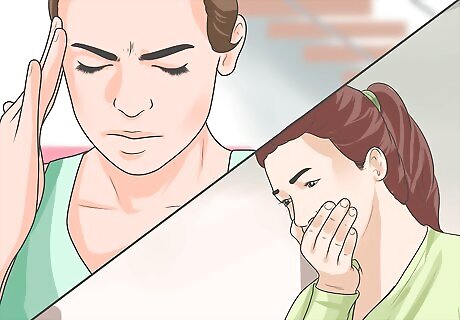
Note instances of nausea, vomiting and diarrhea. These symptoms, which are commonly associated with the flu, can also indicate an early HIV infection. Get tested if these symptoms persist.
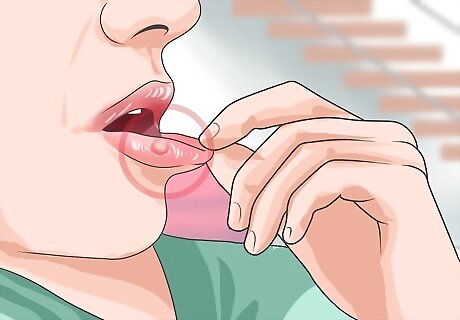
Pay attention to mouth and genital ulcers. If you see a mouth ulcer appear along with the other symptoms noted, especially if you don't commonly get mouth ulcers, it may be a sign of primary HIV infection. Genital ulcers are also an indication that HIV may be present.
Recognizing Advanced Symptoms
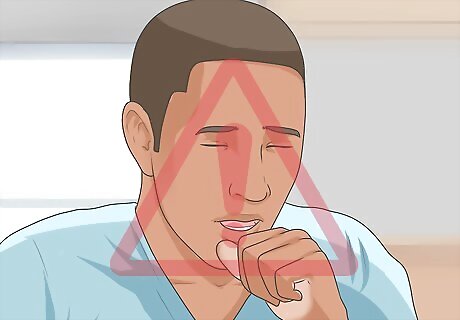
Don't dismiss a dry cough. This symptom occurs in the later stages of HIV, sometimes many years after the virus has been contracted and been latent in the body. This seemingly innocuous symptom is easy to ignore at first, especially if it occurs during allergy season or during cough and cold season. If you have a dry cough you just can't seem to kick by taking allergy medications or using an inhaler, it may be a symptom of HIV.
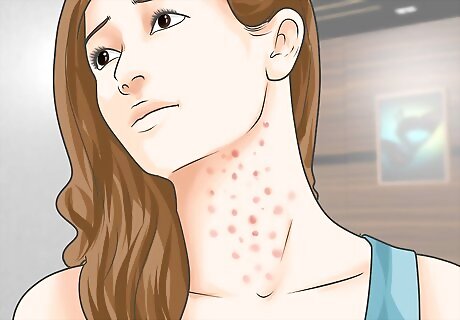
Look into irregular spots (red, brown, pink, or purplish in color) on the skin. People in the later stages of HIV often get rashes on their skin, especially on the face and torso. These can also be present on the inside of the mouth and nose. It's a sign that the HIV is developing into AIDS. Flaky, red skin is also a sign of later stage HIV. The spots may also look like boils or bumps. A skin rash usually doesn't accompany the flu or a cold, so if you have one at the same time as other symptoms, see a doctor right away.
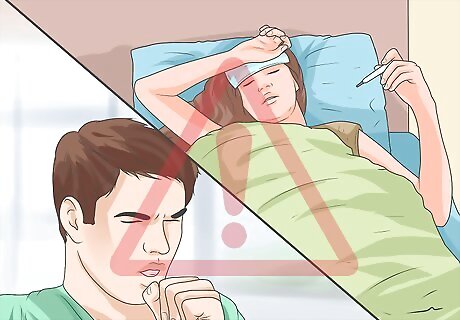
Pay attention if you get pneumonia. Pneumonia often affects people whose immune systems aren't working properly. People with later-stage HIV are prone to getting pneumonia from a germ that wouldn't normally cause such a severe reaction.
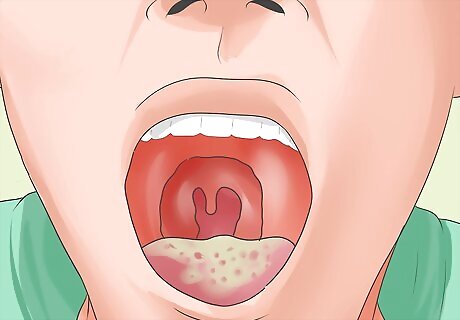
Check for yeast infections, especially in the mouth. Later-stage HIV patients commonly get a yeast infection in the mouth, called thrush. The condition looks like white spots or other unusual spots on the tongue and inside of the mouth. This is a warning sign that the immune system isn't effectively fighting off infection.
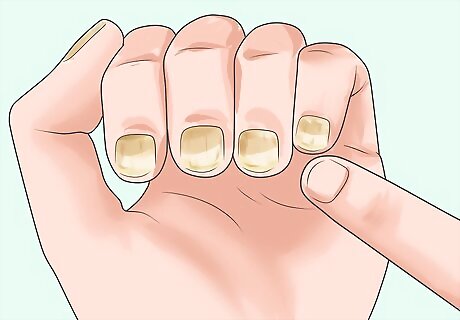
Examine your nails for signs of fungus. Nails that are yellow or brown, and that are cracked or chipped, are common among later-stage HIV patients. The nails become more susceptible to fungus, which the body is able to fight off under normal conditions.
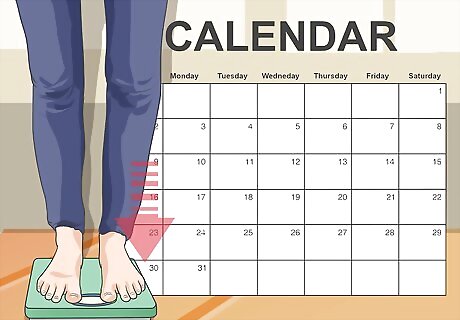
Determine whether you're experiencing rapid weight loss with no known cause. In the early stages of HIV, this could be caused by excessive diarrhea; in later stages, it's known as "wasting," and is a strong bodily reaction to the presence of HIV in the system.

Be aware of neurological issues. These could include memory loss, depression, or other neurological afflictions. HIV affects the cognitive function of the brain in later stages. These symptoms are serious and should be looked into no matter what.
Understanding HIV

Know if you are at risk. There are several different circumstances that can place you at risk of contracting HIV. If you've experienced one of the following situations, you are at risk: You've had unprotected anal, vaginal, or oral sex. You've shared needles or syringes. You've been diagnosed or treated for a sexually transmitted disease (STD), tuberculosis, or hepatitis. You received a blood transfusion between 1978 and 1985, the years before safety precautions were in place to prevent tainted blood from being used in transfusions.
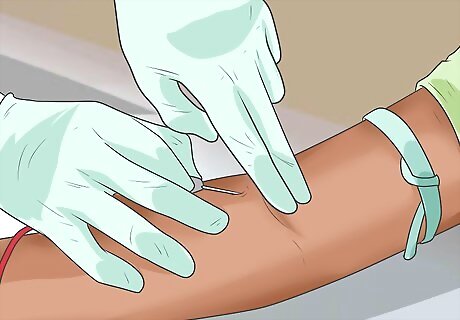
Get tested for HIV. This is the most accurate measure in determining if you have HIV. Contact a local health clinic, the Red Cross, your doctor's office, or another local resource to find out where to get tested. Go to the website aids.gov for a listing of testing locations. Testing is easy, affordable, and reliable (in the majority of cases). The most common test is done through drawing a blood sample. There are also tests that use oral fluids (collected with a swab) or urine. There are even tests you can take at home. If you do not have a regular physician who can provide testing, contact your local Health Department. If you are tested for HIV, do not let fear prevent you from obtaining your test results. Knowing whether or not you are infected will give you the best chance to treat your condition, or to change your lifestyle to prevent an infection. Many health organizations recommend getting tested as part of your routine physical, even if you don’t think you are at risk. Catching and treating HIV early can help prevent later complications.
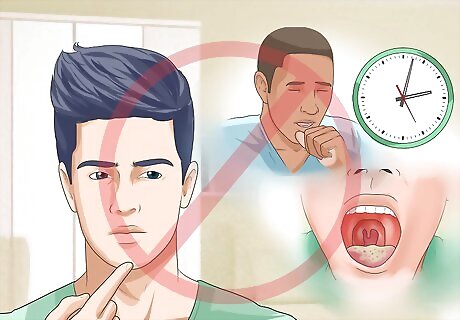
Don't wait for symptoms to occur to get tested. Many people with HIV don't know they have it. The virus can be carried in your body for over ten years before symptoms begin to occur. If you have reason to think you may have contracted HIV, don't let a lack of symptoms stop you from getting tested. It's best to know as soon as possible.




















Comments
0 comment